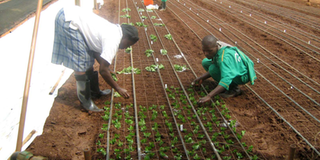Agony as flower export orders continue to decline

BUSINESS GOES ON: Fiduga Uganda Limited employess plant new seedlings. PHOTO BY D. NAKAWEESI
What you need to know:
Ms Musoke said the prices are not good with the few flowers that are being exported and the players are not earning as much as they used to.
Kampala
The future looks bleak for Uganda’s flower industry as export business continues to decline. In a recent interview with Business Power, the Executive Director of Uganda Flower Exporters Association (UFEA), an umbrella organisation of close to 20 players, Ms Juliet Musoke, said: “This is the Valentines’ season, which is supposed to be a peak period for the companies to export. But orders are not coming in and its worrying everybody.”
Ms Musoke said the prices are not good with the few flowers that are being exported and the players are not earning as much as they used to.
The industry’s export revenue predictions for 2009 were $35 million (Shs68.2 billion) out of the 7,000 tonnes shipped, which according to Ms Musoke are indications that the earnings will be less than the projections.
In 2008, the country exported close to 6,556 tonnes valued at $34 million (Shs66.3 billion). This is happening at the time when all the firms were expected to have complied with the expansion five-programme to boost production and increase new investments. In its plan, dubbed the Uganda National Floriculture Industry Strategy, UFEA embarked on a campaign to double production from present 200-hectare to at least 400 by 2010.
This was to translate into an annual export earnings in excess of $50 million (Shs97.5 billion) up from about $30 million (Shs58.2 billion) recorded at the close of 2006. Fiduga Uganda Ltd is one of the companies that responded to the expansion programme. The firm, which initially had about 12 hectares, has expanded to 17 hectares.
More problems
However, Mr Jacques Schrier, the managing director of Fiduga Uganda Ltd, told Business Power in a recent interview that they have 17 hectares, but five hectares are empty, because there are no sales.
Mr Schrier says as all this is happening at a time when they are struggling with the workers union, who want the workers’ wages revised upwards. “They are very aggressive and militant. It’s very difficult to find a common goal with them, which affects the industry, in total,”
Ms Musoke said the workers have been getting about Shs2,500 per day and they want an increment. “It is going to be a difficult year for the firms especially when they also have to pay loyalities to the breeders even when they are not making money,” Ms Musoke said.
Ray of hope
The only source of hope for the industrial players is the 10-year tax holiday, which is becoming effective this year. In the 2007/8 budget speech, the government announced new investment incentives among which was a 10-year tax holiday to companies engaged in value added exports, withholding tax exemptions, stamp duty exemption in share capital and mortgages. The other tax is duty and tax exemption is raw materials, plant and machinery. According to Musoke, the holiday will help the exporters with something to plough back in their businesses as things normalise.




